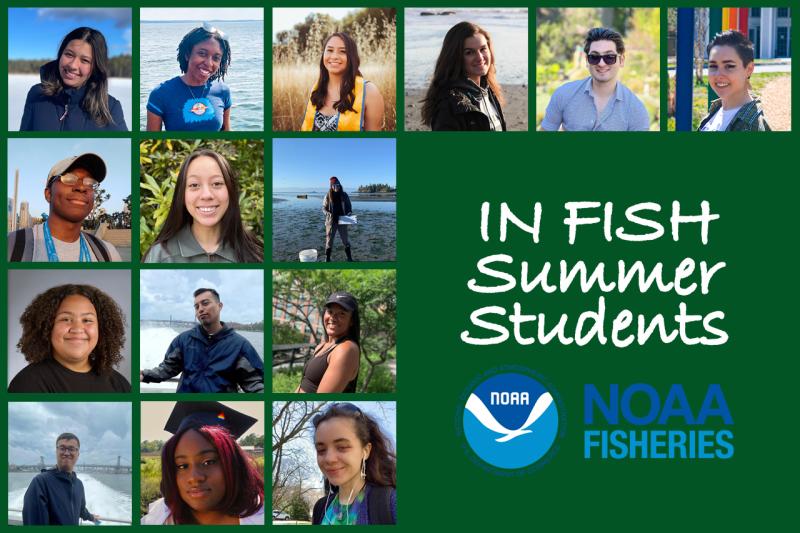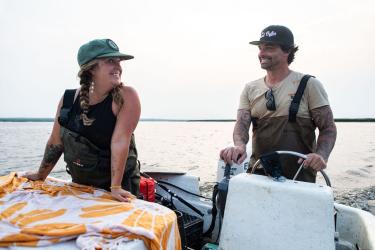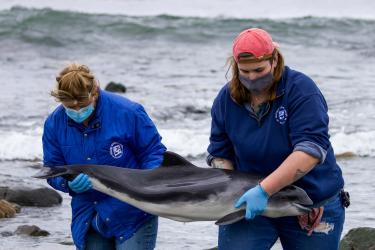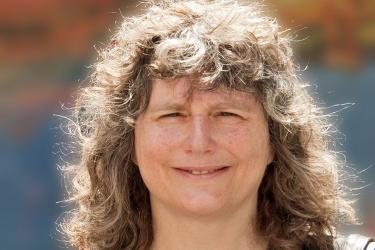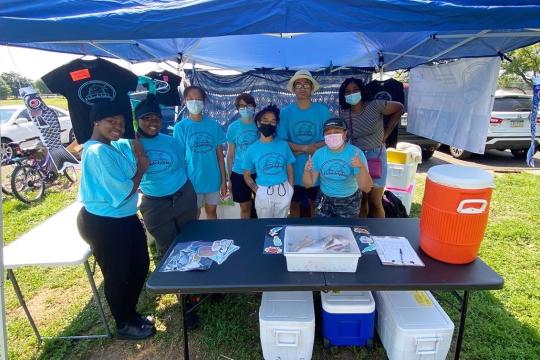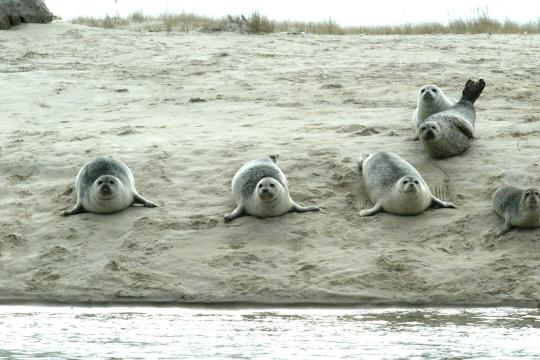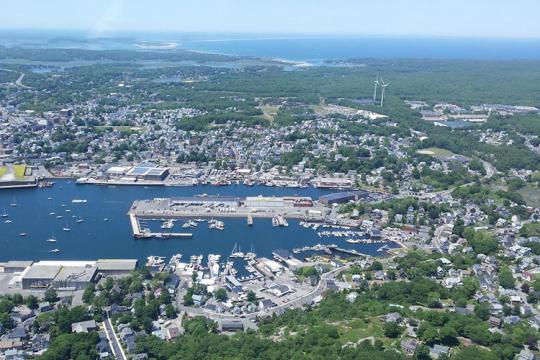In its second year, the Inclusive NOAA Fisheries Internship (IN FISH) partners NOAA scientists with academic and private non-profit researchers to build a diverse and inclusive workforce. This year's class of 15 IN FISH students hail from four countries and/or U.S. territories, 12 states, and 13 different colleges and universities in 11 states. Project topic areas range from climate science, endangered species, fisheries, and habitat to public policy, fishing community resilience, seafood marketing, and Indigenous knowledge.
In each profile, students outline their project, explain why it's important, and—always the most compelling part—share insights they’ve gained into marine science as a career during their time with us
Edgar Alvarez (He/Him/His)
Bio:
Hometown: Los Angeles, California
University: California State University Long Beach in Long Beach, California
Major: Geography
Internship Mentor(s):
- Karen Abrams, NOAA Fisheries’ Office of Sustainable Fisheries
Project:
For my research, I’ve been studying catch shares to see if they create incentives that promote environmental stewardship in catch share participants. My project will also include converting details of catch share programs into a format that is accessible to the public.
Insight:
I’m interested in public policy that ensures proper management of our environment and natural resources while strengthening our economy and resource conservation. My internship has helped me gain experience in public policy. I hope to use this experience to explore the aspects of public policy geared towards minimizing environmental impacts and providing sustainability.
Teemer Barry (He/Him/His)
Bio:
Hometown: Durham, North Carolina
University: University of Maryland Eastern Shore in Princess Anne, Maryland
Major: Environmental studies
Internship Mentor(s):
- John Kocik, Northeast Fisheries Science Center
Project:
For my project, I’ve been refining the methods used to determine Atlantic salmon habitat suitability. For this, I’ve been reviewing the most recent studies about how the environment affects salmon growth. I’ve also been comparing the methods used in recent studies to those in the most recent habitat suitability index. I hope that the results of my research can be used to calculate a new habitat suitability index for future conservation practices.
Insight:
The IN FISH Program has given me a fantastic opportunity to network with career peers and NOAA staff. It will certainly help shape my career moving forward!
Jennifer Braveboy (She/Her/Hers)
Bio:
Hometown: Marysville, California
University: University of Washington in Seattle, Washington
Major: Environmental studies
Internship Mentor(s):
- Sarah Wise, Alaska Fisheries Science Center
Project:
My project explores how people think about, interact with, and experience the marine environment. To do this, I’ve been reading scientific papers that include Indigenous knowledge and writing annotated bibliographies. I would like to show the significance and meaning of places, marine species, environmental interactions, and values as they contribute to community well-being in an ecosystem model.
Insight:
My favorite part of my internship is working with my mentor and a team of social scientists. I have always worked on the physical science side and this experience allows me to go full circle in my understanding of projects that I am interested in.
Savannah Clax (She/Her/Hers)
Bio:
Hometown: Canton, Ohio and Louisville, Kentucky
University: Savannah State University in Savannah, Georgia
Major: Marine science
Internship Mentor(s):
- Andrew Thompson, Southwest Fisheries Science Center
Project:
I’ve been assisting the California Cooperative Oceanic Fisheries Investigations ichthyoplankton stock assessment team in analyzing anchovy otoliths—tiny structures in the ears of fish that are used to determine age. We’re looking to see if and how marine heat waves impact anchovy growth rates. We’re also studying the impacts of marine heat waves on other fish species that the Pacific States Marine Fisheries Commission is interested in.
Insight:
My favorite part of my IN FISH internship has been the ability to network with NOAA scientists and learn more about the variety of careers within NOAA. Connecting with my cohort after my other virtual or solo internships was amazing! Making all those connections not only with my peers and future colleagues but also with great friends was the best.
Lael Collins (She/Her/Hers)
Bio:
Hometown: Charlotte, North Carolina
University: University of North Carolina at Wilmington in Wilmington, North Carolina
Major: Environmental studies
Internship Mentor(s):
- Michael Wilberg,University of Maryland Center for Environmental Science’s Chesapeake Biological Laboratory
Project:
For my project, I’ve been looking at the population abundance and mortality of striped bass along the East Coast of the United States and developing indices of abundance for these populations. One of the challenges with striped bass survey data is that there are several surveys spanning multiple states and using different sampling methods. The goal is to find a more universal method for tracking striped bass across all the states that have a fishery.
Insight:
One of the greatest takeaways from this program is the diversity, not only in the students, but also in topics. We’re all students in some sort of STEM field, mostly centering around biology, environmental science, or marine sciences. That means there are a wide variety of projects that we can take part in to expand our knowledge and interests. IN FISH also provided lots of hands-on opportunities which helped me hone my fieldwork skills and grow as a student of ecology.
Camille Cube (She/Her/Hers)
Bio:
Hometown: Falls Church, Virginia
University: University of Washington in Seattle, Washington
Major: Environmental science and resource management
Internship Mentor(s):
- Daniel Cullen, University of Maryland Eastern Shore
Project:
I’m examining the habitat distribution of Jonah crab and Atlantic rock crabs along the U.S. Atlantic Coast. These crabs are economically important fisheries in this region. I am using ArcGIS to create maps of their distributions. I’m also conducting “hot spot” analyses, an ArcGIS tool to look at cluster patterns. I’m using it to see where there are high crab observations (hot spots) or low crab observations (cold spots) along the Atlantic Coast. This research will contribute to Jonah and Atlantic rock crab stock assessments in this region.
Insight:
This internship has taught me how to think in systems and to notice systems everywhere in our lives. I’m learning a lot about how systems thinking is important for managing natural resources, especially for NOAA scientists. This Program is opening my eyes to graduate school opportunities and all the possibilities in science that lie ahead.
Litzia Galvan (She/Her/Hers)
Photography
Bio:
Hometown: Anaheim, California and Yanga, Veracruz in Mexico
University: University of California, Santa Cruz in Santa Cruz, California
Major: Marine biology
Internship Mentor(s):
- Joan Muller, Waquoit Bay National Estuarine Research Reserve
- Megan Tyrell, Waquoit Bay National Estuarine Research Reserve
Project:
At Waquoit Bay National Estuarine Research Reserve, I’ve been working alongside researchers to monitor changes in salt marsh ecosystems. The Reserve conducts all kinds of fieldwork, including measuring marsh surface elevation, adjusting marsh vegetation plots, collecting water quality data, and setting up camera traps. This work helps to monitor biological and physical change in salt marshes that climate change could be accelerating.
Insight:
As a first-generation student, I’ve faced multiple challenges in STEM. I’ve had to figure out ways to improve my academic skills and find student resources that will help advance my career path. The IN FISH Program is a great opportunity for me to further my academic journey. During my internship, I’ve been learning fundamental skills that benefit my career growth—everything from research techniques and statistical software to understanding the importance of salt marshes in the marine environment and networking with field professionals in my field. It’s been great to interact with other students with similar backgrounds and majors. This experience has helped me feel that I belong in the scientific community.
Carlos Garcia-Patlan (He/Him/His)
Bio:
Hometown: Monterrey, Nuevo León in Mexico
University: University of Texas Rio Grande Valley in Edinburg, Texas
Major: Environmental science
Internship Mentor(s):
- Peter Kuriyama, Southwest Fisheries Science Center
Project:
For my project, I’ve been working with my mentor to analyze Northern anchovy and Pacific sardine population data collected by California Cooperative Oceanic Fisheries Investigations and NOAA’s Rockfish Recruitment and Ecosystem Assessment Survey along the California Coast. I’ve been using a statistical computing and graphics software called R to look at correlations between the different life stages of anchovies and sardines, specifically their eggs, larvae, and juveniles. The goal is to determine if there are any trends or patterns in the recruitment and distribution of these species at different life stages. This type of analysis helps determine fishing limits based on population sizes and recruitment to prevent overharvesting.
Insight:
I have learned a lot so far in this internship, and I believe these skills will help me as I continue my education in the environmental science field. Exposure to hands-on experiences, lectures on different topics, individuals with expertise in different fields, and opportunities to make connections with people of all backgrounds has allowed me to broaden my understanding of this field of study and has inspired me to continue my studies and research towards conservation and sustainability.
Sarah Hensley (She/Her/Hers)
Bio:
Hometown: Ansbach, Germany
University: University of Washington in Seattle, Washington
Major: Marine biology
Internship Mentor(s):
- Sean Lucey, Northeast Fisheries Science Center
- Sarah Gaichas, Northeast Fisheries Science Center
Project:
My project for this internship focused largely on fish diet data collected by the Northeast Fisheries Science Center. I’ve been looking at changes in fish consumption—how much fish eat—over several years and assessing if and/or how changing ocean conditions influence this change. We’re also developing computer models to better understand prey size preference of fish in this region. This work will help inform fisheries managers and contribute to the annual status of the ecosystem reports.
Insight:
The IN FISH Program has helped me broaden my understanding of ecosystems and their intricate dynamics. It’s also allowed me to develop an incredible network within the NOAA agency and among peers. A two-week complex ecosystems course has allowed me to expand my knowledge of the connectivity between the vast biological, chemical, and physical systems present in our ecosystems and assess these relationships through current examples. This internship has also helped me to develop the statistical analysis skills needed to understand these complex systems and better understand factors that influence these interactions in real time. Overall, it’s expanded my understanding of the work NOAA does and has allowed me to develop a network of helpful and talented individuals.
Hannah Jarvis (She/Her/Hers)
Bio:
Hometown: Beverly, Massachusetts
University: Dartmouth College in Hanover, New Hampshire
Major: Environmental studies
Internship Mentor(s):
- Joshua Stoll, University of Maine
- Theresa Burnham, University of Maine
Project:
Social vulnerability and resilience affect a community’s ability to respond and adapt to change. Resilient communities are able to cope with external stresses and disturbances from social, political, and environmental change. For my project, I’ve been developing socioeconomic indicators of fishery resilience within the Maine lobster fishery. The goal of these indicators is to detect early signs of vulnerability among coastal communities and lobster harvesters. I’ve been focusing on business investments in particular, looking at how fishermen invest in their businesses through things like boat and equipment purchases and licensing.
Insight:
The IN FISH Program has taught me a lot about the multidisciplinary world of marine and oceanic sciences. I’ve gained experience with the technical aspects of my project, like using a statistical computing and graphics software called R and R Shiny to create an interactive web app. I’ve also gained insight into policy and industry through trips to different universities, laboratories, and organizations. I now have a much deeper and more well-rounded understanding of the world of marine and oceanic sciences, and this experience has helped me consider the work I’ve been involved in as a career path.
Learn more about Hannah's intern experience in her blog.
Ophelia McGrail (They/Them)
Bio:
Hometown: Georgetown, Massachusetts
University: Wheaton College in Norton, Massachusetts
Major: Biology
Internship Mentor(s):
- Corrine Kane, NOAA Fisheries’ Greater Atlantic Regional Fisheries Office
Project:
I’ve been helping to establish a management plan for the Northeast Canyons and Seamounts Marine Protected Area. This includes developing social media content to help promote the plan and communicate the importance of fragile and largely pristine deep marine habitats with rich biodiversity. I’ve also been working on improving diversity and inclusion within the Greater Atlantic Regional Fisheries Office.
Insight:
I’m interested in studying the social behavior, sensory biology, population dynamics, and conservation of large migratory species, especially sharks. This project has allowed me to make many new connections in the field of highly migratory species biology and management. During my time with NOAA, I’ve learned important strategies to help adapt fisheries management work into meaningful scientific communication content for various audiences. I’ve also learned how to look at a problem from the view of the entire system, not just a single part or function. I am delighted to be part of the 2022 IN FISH cohort!
Charlene Pérez-Santos (She/Her/Hers)
Bio:
Hometown: Camuy, Puerto Rico
University: University of Puerto Rico Humacao in Humacao, Puerto Rico
Major: Marine biology
Internship Mentor(s):
- Joshua Stoll, University of Maine
- Sahir Advani, University of Maine
Project:
Small-scale seafood producers face a range of threats, including competition with cheap imports. Direct seafood marketing can help seafood producers earn more for their catch, which helps sustain their livelihoods. To better understand the number, scale, and geographic distribution of seafood producers engaged in direct marketing, I’ve been helping to develop and implement the first-ever national survey of direct marketing practices—the American Seafood Harvesters Marketing Practices Survey.
Insight:
The IN FISH Program has given me the opportunity to learn about other aspects of the scientific field that are not taken into account commonly. Concepts such as statistics, economics, fisheries, software such as R, and complex systems are helping me prepare for a career in science. The communication between my mentor and the rest of the team has been amazing. They make you feel totally welcome and are willing to help you with anything you need. Connecting with people across the country has been fascinating! I’ve learned a lot about NOAA Fisheries, and the career opportunities within the agency make you appreciate what science is really about. Also, representing my community as the first Puerto Rican to join the Program makes me value this opportunity even more. And of course, if you want to network for graduate school, this is the place!
Learn more about Charlene's intern experience in her blog.
Jiyahna Price (She/Her/Hers)
Bio:
Hometown: Belleville, Michigan
University: Bethune-Cookman University in Daytona Beach, Florida
Major: Integrated environmental science
Internship Mentor(s):
- Michael Acquafredda, Northeast Fisheries Science Center
Project:
For my research project, I’ve been studying how salicornia plants—a succulent flowering plant found in salt marshes, on beaches, and among mangroves—respond to different stocking densities. These plants are called sea bean, samphire, pickleweed, saltwort, glasswort, sea asparagus, and sale dei poveri. The goal is to increase marketability of a salt-tolerant aquaculture crop and demonstrate its potential as a high-value sea vegetable. To help with that, we want to find the best stocking density that will reduce stem woodiness and increase biomass. We’re using an integrated growing method that uses mummichog fish waste as a nutrient source for the plants. This means farmers won't need to add fertilizer to their crops. My work will help inform another study looking at the feasibility and sustainability of a multi-trophic recirculating aquaculture system with striped bass, sandworms, and salicornia.
Insight:
The IN FISH Program has allowed me to establish connections with other interns from all over the country. I’m grateful for this chance to be a part of such a diverse group where we can all learn from one another and help each other grow. Not only am I a part of a great cohort, but the Program staff and guest speakers have been amazing. This internship has given me the opportunity to expand my knowledge about aquaculture, improve my communication skills, and gain experience that will be useful for my future career in marine research. I have learned so much already and I am excited to see the results of all our projects at the end of the summer!
Brian Tran (He/Him/His)
Bio:
Hometown: San Rafael, California
University: California State University, Monterey Bay in Marina, California
Major: Marine science
Internship Mentor(s):
- Thomas Laidig, Southwest Fisheries Science Center
Project:
The group that I am working with collects underwater videos to better understand distribution and abundance of invertebrates off the coast of Oregon in an area called Daisy Banks. Regional fishermen know this area as “Nelson Island.” Several people review these videos and document species and where they’re found. The goal of my project is to determine if there are biases between different reviewers. To do this, I’ve been watching videos and counting deep-sea sponges. Then I used a statistical computing and graphics software called R to develop statistical models to compare counts among reviewers. It’s critical to know and resolve reviewer biases because reviewer data will be used in ecosystem models that inform fisheries management.
Insight:
My favorite part of this internship is working with a small group of scientists to connect and build relationships and explore other aspects of marine science that I might be interested in. This internship builds my motivation for my future career in science and gives me real-life practice with data analysis, social networking, and professional presentations.
Emily Vasquez (She/Her/Hers)
Bio:
Hometown: Fair Lawn, New Jersey
University: Monmouth University in West Long Branch, New Jersey
Major: Marine and environmental biology and policy
Internship Mentor(s):
- Katherine Mills, Gulf of Maine Research Institute
Project:
My project examines fish species vulnerability assessments from waters around the world. I’ve been collecting data from scientific literature to compare the biological sensitivity and climate exposure factors used to better understand the connection between a species' biological traits and its environment. I’ve also been identifying gaps in the assessment process, especially for highly vulnerable species like diadromous fish, which migrate between freshwater rivers and the ocean. Structures like dams threaten their survival.
Insight:
My time at the Gulf of Maine Research Institute has helped me better understand the complexity of fishery systems, data collection and analyses, and the collaborative nature of communicating scientific research effectively. I found purpose in communicating others’ research that was years in the making. As an IN FISH intern, I’m thankful for all the connections I’ve made and knowing I can always find someone to answer all of my questions. Tying my project into our class on ecosystem dynamics has made me excited to one day apply what I’ve learned here to a habitat restoration job.
For more information, please contact Heather Soulen.
